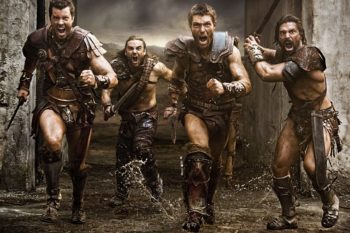Last week we discussed factors that influence a person’s ability to take another person’s life.
It’s hard. The closer you are and the more intimate the manner of killing, the harder it gets. We’ve discussed some of the psychological impacts that affect a person’s desire to engage in combat, those core fears that must be overcome to bring oneself into the arena, so to speak, to engage the enemy. Yet in speculative fiction across every genre we are exposed to characters who wade into battle without hesitation (or hesitation that is not fully developed), and perform the most miraculous of feats with nary a second thought. We love the fearless Aragorns and Legolas’, the intrepid space marines and underdog-turned-superhero who make up the large majority of our casts of characters.
Back to our Grossman reference of On Killing. The vast majority of people must overcome strong resistance to take a life in combat. Yet some people feel little fear of this kind of “up close and personal war.” Statistics derived from World War II, but consistent with records from other conflicts indicate that when human beings are locked in close personal combat for a period of around six weeks or more, between 96% and 98% of those fighting become psychological casualties. What it means to become a psychological casualty we’ll talk about in a later installment, but notice here that 2 to 4 percent do not suffer psychologically at all, or to a much lesser degree. This group, this unusual minority, we’ll call “The Fearless Elite.”
“Fearless” is not really the right term. This minority can experience fear (though not all do). But unlike the overwhelming majority of us, they can fight in sustained combat conditions without showing any sign of damage to their inner-selves. Note that since the fright or surrender reactions are involuntarily triggered by psychological stress, this small minority also seem resistant to throwing up hands in panic or uncontrollably running away. They may still feel fear and still surrender or run–but they would do so by choice it seems, because it makes sense at the moment, rather than because of an uncontrolled emotional and mental reaction.
Why is this small minority different? The answers are not completely known, but it seems the group can be divided in rough halves according to On Killing:
Half of this group are immune to the psychological damage of combat because there is something deeply wrong with them–they are psychopaths. Psychopaths, sometimes interchangeably called “sociopaths” (but there is a difference between the two terms), do not feel empathy for other human beings or only feel it in the tiniest amount. Killing someone else is nothing to them and they likewise are much less concerned with their own deaths.
The other half seems to be composed of people who are otherwise perfectly normal, who react differently to combat than most people for largely unknown reasons–though being naturally calm and highly resistant to getting stressed out seems to be related to what makes these people unusual.
Remember our opening: 2 to 4 percent of the total human population exhibits this behavior, and split that in half for each of the possible causes.
An author of tales should immediately recognize that a lot of war story writing has been focused on these unusual people. The villains, those who kill and feel nothing for any one–the heroes, who do feel, but are so calm and level-headed they manage to do the right thing even in the worst of scenarios. These are the men of legend and history, these are the Odysseus, the Achilles, the Spartacus, and Audie Murphy figures; the other half represents Genghis Khan, Ashurbanipal, and Joachim Peiper.
The Fearless Elite.
Conditioning and selection of the elite
It might be tempting to say that the 300 Spartans who stood with King Leonidas at Thermopylae were all naturally elite soldiers. But there is no suggestion based on scientific evidence that any nation of people will have a higher percentage of natural warriors than any other. In fact, the historical record seems to indicate that Spartan courage was not the product of natural affinity for warfare, but of superior “unnatural” training. In fact, elite training is the main ingredient in what makes certain individuals and military units superior to others. Training can condition any soldier, but is particularly useful in conditioning the already elite.
Though it is also true that joining an elite unit is voluntary, people of this “warrior elite” mentality (both halves) tend to seek to join elite military units. So, whether among King David’s mighty men or the U.S. Navy Seals, Army Rangers and Green Berets, or other elite units, the percentage of warriors more resistant to the psychological harm of combat is higher in elite units than in ordinary ones. This is partially why modern airborne units, in which every member has to face the fear of jumping out an airplane, tend to be considered elite. Or put another way, fear suppresses the effectiveness of a military unit in combat and so “elite” units who recruit from people who are the most fearless—who have passed through some form of ordeal proving their courage–fight more effectively and have a greater capacity/capability to conduct certain missions than “regular” units.
It might be interesting to write a story about a non-human race where all the soldiers naturally behave as if they were elite. Or where human beings are genetically engineered to fight without remorse or fear. Note that someone who fights without any regrets or fear would be lacking something psychologically–this lack should show somehow in a story. Even if the lack is missing the ability to enjoy ordinary events because of supreme natural calmness.
Soldiers in sci-fi
Travis C. here with some discussion and illustration from the literature. One of the first DVDs I bought was Kurt Russell’s 1998 movie Soldier, a science fiction story about a soldier produced by a program that takes orphans and conditions them to suppress those natural reactions and fears, creating an elite fighting unit. The program weeded out the other 96-98% quickly, leaving that Fearless Elite to fight for humanity. When exposed to a shipwrecked homesteader community, the main character must adapt to integrate into society. Fast forward that concept and you have the beginnings of M. Night Shyamalan’s After Earth.
Here we’re getting closer to the fantasy and sci-fi writers realm of the fantastical. The race of S’krells have an objective to conquer the new human homeworld of Nova Prime. Their weapon? Creatures known as Ursas who can sense fear in the human population. How do humans respond? The Ranger Corps, an elite unit of soldiers selected and conditioned to suppress their fear in order to combat the Ursas (a skill known as ghosting). It’s with that context we watch a pretty vanilla story about a father-son relationship.
 Likely? Not particularly. Again, 2 to 4 percent of people have a capacity to operate in a combat environment without the natural resistance to combat actions we discussed earlier. Now let’s temper that with the research: that resistance to killing is directed towards humans. The Ursas seem pretty horrific, and there’s a clear sense of present danger driving the actions of the Ranger Corps (i.e., the extinction of the human race). Also as we said, it’s not that the Fearless Elite don’t feel fear, they are just capable of operating without significant limitations in those conditions. But we do see a common theme: conditioning of the soldier, possibly an already elite and rare soldier to begin with, to create one even more capable in battle.
Likely? Not particularly. Again, 2 to 4 percent of people have a capacity to operate in a combat environment without the natural resistance to combat actions we discussed earlier. Now let’s temper that with the research: that resistance to killing is directed towards humans. The Ursas seem pretty horrific, and there’s a clear sense of present danger driving the actions of the Ranger Corps (i.e., the extinction of the human race). Also as we said, it’s not that the Fearless Elite don’t feel fear, they are just capable of operating without significant limitations in those conditions. But we do see a common theme: conditioning of the soldier, possibly an already elite and rare soldier to begin with, to create one even more capable in battle.
Let’s finish with another example from the realm of science fiction: the Star Wars universe and the clone army. The early Imperial army is made up of cloned soldiers from Kamino based on the genetic template of bounty hunter Jango Fett. After an accelerated growth period these soldiers are put through a rigorous training program to condition them into the Stormtroopers we’re all familiar with. (And if you aren’t familiar, just drive around your neighbor and look for the Stormtrooper family stickers on every minivan and SUV. Or suffer through Star Wars Episode II: Attack of the Clones.)
 We witness the results of this genetic modification, combined with regimented conditioning, through the franchise, and only in recent years are we seeing the storyline of the movies open up to the possibility of a Stormtrooper breaking out of that mold in the character Finn. Stormtroopers appear fearless against any foe, against any race or species of the galaxy, even against the droid army on Geonosis. Just pull the blaster trigger. Don’t think, don’t react. Don’t respond to fear.
We witness the results of this genetic modification, combined with regimented conditioning, through the franchise, and only in recent years are we seeing the storyline of the movies open up to the possibility of a Stormtrooper breaking out of that mold in the character Finn. Stormtroopers appear fearless against any foe, against any race or species of the galaxy, even against the droid army on Geonosis. Just pull the blaster trigger. Don’t think, don’t react. Don’t respond to fear.The fantasy hero
In the realm of fantasy writing, I’d suggest we writers examine one of our longest-living tropes, the idea of the untrained, unconditioned coming-of-age-teenager (boy or girl), who is thrust into a new environment/out of their old environment, and through a journey with a guardian alongside finds it in themselves to develop this fearless attitude/condition and overcome astronomical odds against a nearly omnipotent foe. We’ve certainly seen the evolution of the Hero’s Journey since Joseph Campbell proposed his monomyth theory and not all stories are quite so blatantly conceived. Many try to do justice to the change element in the main character, showing us their growth from unaware/naive/broken/weak into strong/courageous/fearless/skilled, but if we’re being honest, that’s an exceptionally rare occurrence if the result is getting to that 2-4% Fearless Elite state.
Admittedly, we want to hear the story of the average, everyday pigboy who becomes a knight and later a king. I’m more like Shasta the fisherman’s boy than King Cor of Archenland, but I love the hope that C.S. Lewis creates to become a great man. The world needs great coming of age stories to help inspire and guide the next generation of real heroes in every sphere of influence. However, we have the power to deceive them with unrealistic expectations of the human capacity for fearlessness.

There are Aragorns in the world, but we’re more likely to see a stout-hearted Samwise if we honestly look around us. Let’s be honest with our readers as we develop characters that are real and exciting enough to capture and hold their attention but also true to the human condition. Training and conditioning can go a long way to improve the capacity of the 96 percent soldier, but it’s a rare few that exhibit the traits we find in that last 4 percent. How many of your cast are from that 4 percent?
I also want to leave you and I with some hope. That other 96 to 98 percent? Training and conditioning benefits them as well, and will result in a spectrum of positive responses to fear in combat. Some will always struggle with reactions we’d deem as cowardice, but many will stand up and perform brave and honorable acts while suffering varying degrees of psychological damage as a result. We’ll talk about that outcome later in the series.
Lastly, let’s always keep close in mind God’s command and promise to all of us: “Have I not commanded you? Be strong and courageous. Do not be afraid; do not be discouraged, for the Lord your God will be with you wherever you go” (Joshua 1:9, NIV). That’s great encouragement from the God who created all 100 percent of us.

Comments
Post a Comment